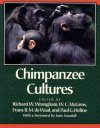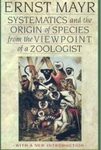By: Richard W Wrangham(Editor), William C McGrew(Editor), Frans BM de Waal(Editor), Paul G Heltne(Editor), Dame Jane Goodall(Foreword By)
424 pages, 41 b/w photos, figs, tabs
![Chimpanzee Cultures Chimpanzee Cultures]()
Click to have a closer look
About this book
Contents
Customer reviews
Biography
Related titles
About this book
The world's leading authorities on chimpanzees and bonobos chronicle the animals' behaviour in captive, laboratory conditions, and wild, field settings. The result is a thorough documentation of the remarkable variety of behaviours exhibited by these primates. While demonstrating that nature and culture play important roles in the evolution of the Pan species, this book gives many insights into the individual chimpanzee mind and of the chimpanzee and bonobo social groups.
Contents
- The challenge of behavioural diversity / Richard W. Wrangham et al.
Part 1 Ecology:
- Overview - ecology, diversity and culture / Richard W. Wrangham
- Tools compared - the material of culture / W.C. McGrew
- Party size in chimpanzees and bonobos - a re-evaluation of theory based on two similarly forested sites / Colin A. Chapman et al
- The significance of terrestrial herbaceous foods for bonobos, chimpanzees and gorillas / Richard K. Malenky et al
- Hunting strategies of Gombe and Tai chimpanzees / Christophe Boesch
- Comparative locomotor behaviour of chimpanzees and bonobos - species and habitat differences / Diane M. Doran and Kevin D. Hunt
- Comparative analyses of nest-building behaviour in bonobos and chimpanzees / Barbara Fruth and Gottfried Hohman
- Diversity of medicinal plant use by chimpanzees in the wild / Michael A. Huffman and Richard W. Wrangham
Part 2 Social relations:
- Overview - diversity in social relations / W.C. McGrew
- Social role and development of noncopulatory sexual behaviour of wild bonobos / Chie Hashimoto and Takeshi Furuichi
- Grooming relationships in two species of chimpanzees / Yasuyuki Muroyama and Yukimaru Sugiyama
- Reproductive success story - variability among chimpanzees and comparisons with gorillas / Caroline E.G. Tutin
- Ethological studies of chimpanzee vocal behaviour / John C. Mitani
- Pacifying interventions at Arnhem Zoo and Gombe / Christopher Boehm
- Social relationships of female chimpanzees - diversity between captive social groups / Kate C. Baker and Barbara B. Smuts
- Chimpanzee's adaptive potential - a comparison of social life under captive and wild conditions / Frans B.M. de Waal
Part 3 Cognition:
- Overview - culture and cognition / Frans B.M. de Waal
- Understanding chimpanzee understanding / Jan A.R.A.M. van Hooff
- What chimpanzees (might) know about the mind / Daniel J. Povinelli
- The question of chimpanzee culture / Michael Tomasello
- Biobehavioural roots of language - a comparative perspective of chimpanzee, child and culture / Duane M. Rumbaugh et al
- Individual differences in the cognitive abilities of chimpanzees / Sarah T. Boysen
- Field experiments on use of stone tools in the wild / Tetsuro Matsuzawa
Part 4 Afterword and postscript:
- Afterword - review of recent findings on Mahale chimpanzees - implications and future research directions / Toshisada Nishida
- Postscript - conservation and the future of chimpanzee and bonobo research in Africa / Jane Goodall
Customer Reviews
Biography
Richard W. Wrangham is Ruth Moore Professor of Anthropology at Harvard University. William McGrew is Professor of Anthropology and Zoology at Miami University (Ohio). Frans B. M. de Waal was C. H. Candler Professor of Primate Behavior in the Psychology Department and Director of Living Links, part of the Yerkes Primate Center, Emory University. Paul G. Heltne is President, Chicago Academy of Sciences.
By: Richard W Wrangham(Editor), William C McGrew(Editor), Frans BM de Waal(Editor), Paul G Heltne(Editor), Dame Jane Goodall(Foreword By)
424 pages, 41 b/w photos, figs, tabs
"This volume presents the best up-to-date collection of the current state of knowledge of most aspects of chimpanzee behaviour, and it spells out the dangers now facing the apes and their environments. The study of chimpanzee cultures is crying out for more information from the increasingly isolated and diminishing communities of these apes. This book shows what has to be done, and where."
– James R. Anderson, Animal Behaviour
"Chimpanzee Cultures is a title to catch the eye [...] The aims are made explicit at the outset: to create a discipline of 'cultural primatology' by using the tools to the cultural sciences and encouraging the use of ethnography in comparing chimpanzee populations [...] The quality of material on the subject animals is high. All the papers are original, many containing previously unpublished data, and they do an excellent job of highlighting behavioural diversity [...] This is a book chiefly aimed at the scholarly community, yet it carries an important message for all of us. Wild chimpanzee populations continue to decline through habitat destruction and hunting for bush-meat: the bare bones of this are made clear in the book's final chapter by Jane Goodall. The dwindling of any species through human short-sightedness is depressing, but chimpanzees present a special case. Chimpanzee Cultures provides ample evidence that chimpanzees are not simply carbon copies of one another. The species may survive but the extinction of cultures may be proceeding as we speak."
– Thomas Sambrook, Times Higher Education Supplement
"This excellent volume introduces the state of the art in primatology. Its lessons are worth learning. There can be no philosophical understanding of what it means to be human apart from understanding what it means to be chimpanzee."
– Barry Allen, Common Knowledge
"This book is, quite simply, a wonderful review of current knowledge of the Pan genus."
– Quarterly Review of Biology



































